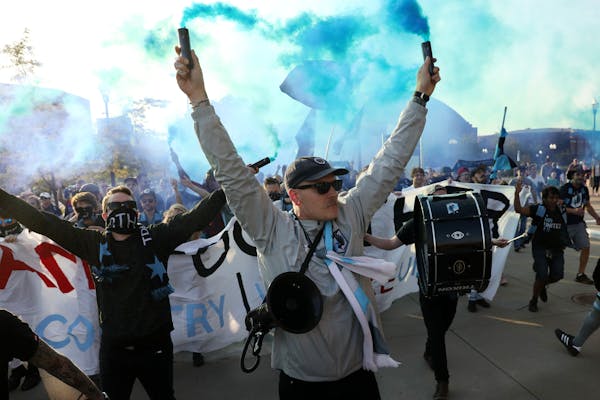The story of this summer in the soccer world was Paris Saint-Germain, which signed both Neymar and Kylian Mbappé. PSG bought the former from Barcelona for something in the neighborhood of $265 million, and the latter from Monaco for a bargain-price $210 million — the two biggest signings in soccer history.
The story of next summer will be the World Cup in Russia. The coverage of the 2014 Sochi Olympics was filled with tales of Russian excess, setting a new low for Olympic wastefulness. If anything, though, next summer's World Cup will seem tame and normal compared to the 2022 edition in Qatar. Five years from now the World Cup will take place for the first time in the winter, in eight glitzy brand-new stadiums built in a country with a fourth-rate domestic league and half the population of the Twin Cities.
These two stories are connected, and not just because they share the common thread of a ridiculous amount of money upending the established soccer order. They're the stories of an oil-rich, influence-poor nation, using the riches from the world's most valuable resource to buy off the world's most popular game.
Qatar Sports Investments, an arm of the Qatari government, purchased PSG, the sleeping giant in France's first city, in 2011. Transformed suddenly into the world's richest club, PSG bought every superstar it could woo to Paris, and vaulted into the French stratosphere, eventually winning four consecutive domestic titles between 2013 and 2016.
The summer of 2017 merely kicked the team's spending into another gear. It almost seemed to be a message to the rest of Europe's teams: Not only can you not outspend us, we have enough money to inflate the player market to the point it's ruined for everyone else. It was similar to the message of Qatar's controversial bid for the World Cup, as the country purchased football's showpiece for itself, logic and sensibility be damned.
All of this is inextricably linked to the Qatari government. Politics bleed into sports everywhere in the world, but the Qatari combination is particularly repugnant. This is not just the prototypical wink-wink, everyone-does-it corruption that usually plagues bids for the Olympics or World Cup. This is a country where companies are allowed to take the passports of migrant workers, who must then get permission to leave the country, and in the meantime are often forced to live in squalor while working for very low wages. The International Trade Union Confederation has projected that some 7,000 migrant workers will die in Qatar before the World Cup begins. Even leaving aside the accusations of support for terrorists that have currently embroiled the country in diplomatic disputes with almost all of its neighbors, it's enough to make any soccer fan queasy about the state of the game.
PSG, Neymar, Mbappé, the World Cup — Qatar is buying up the game of soccer. Along the way, it may ruin it. Soccer has to decide whether it's worth the money.
Short takes
• The NWSL playoff picture is all but set. North Carolina and Portland will host the semifinals of the playoffs; Orlando and Chicago can clinch the other two playoff spots this weekend with wins, or a Seattle loss. North Carolina has led the standings the whole way this year and has a two-point lead over Portland in the regular-season title race with two games to go.
• Sporting Kansas City won its fourth U.S. Open Cup trophy, beating New York 2-1 in the final on Wednesday night. KC now joins Chicago and Seattle as the only MLS teams with four titles. The Red Bulls, meanwhile, still have never won a trophy in the club's history.
• The NASL makes most of its news in the courtroom, these days, and this week was no different. The league filed an antitrust lawsuit against U.S. Soccer after the national soccer governing body declined to give Division 2 status to the NASL for next season, a potentially league-killing move. This is at least the fourth time in the past few decades that U.S. Soccer has been sued on this basis, with none of the previous lawsuits resulting in much change.
WEEKEND WATCH GUIDE
Premier League: Chelsea at Stoke City, 9 a.m. Saturday, CNBC. Under manager Mark Hughes, Stoke has strived to shed the image as phlegmatic, violent, anti-soccer mercenaries that it acquired under Tony Pulis — but even so, it's still hard to win at Stoke. Chelsea needs to keep pace with the Manchester sides.
Premier League: Liverpool at Leicester City, 11:30 a.m. Saturday, Ch. 11. Strangely, this is a rerun of Tuesday's League Cup match — same two teams, same location. Leicester City won that one 2-0, with Liverpool struggling for any sort of answers. Can Jurgen Klopp right the Reds' ship in only four days?
NWSL: Portland at Orlando, 2:30 p.m. Saturday, Lifetime. There's plenty to play for, especially since the match could be a playoff preview, with both teams likely to be in the NWSL final four. Portland still harbors hopes of a second consecutive regular-season title, but probably needs to win to have a chance.
Bundesliga: Borussia Monchengladbach at Borussia Dortmund, 11:30 a.m. Saturday, FS2. German fans are used to seeing Bayern Munich at the top of the table, but after five games, it's Dortmund on top. BVB hasn't conceded a goal yet this year, a sterling defensive record that not many expected.
Writer Jon Marthaler gives you a recap of recent events and previews the week ahead. • jmarthaler@gmail.com

The Hamline Elite Meet, already in rare air, presents a co-ed look
Bevy of defensive playmakers are available in Round 2 of the NFL draft after historic offensive run
Twins bring momentum on road despite Angels Stadium struggles

Neal: McCarthy mania sweeps through Vikings draft party

